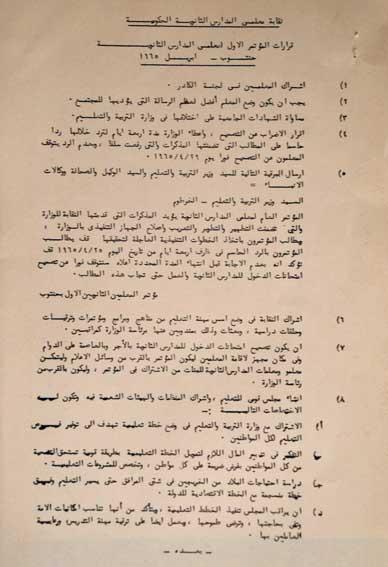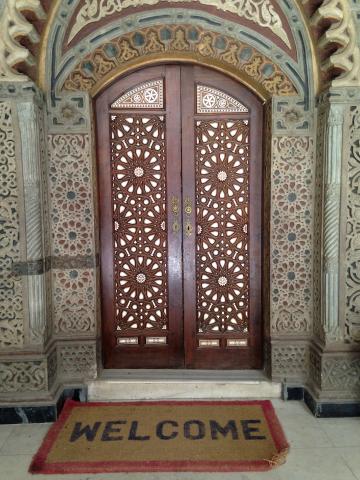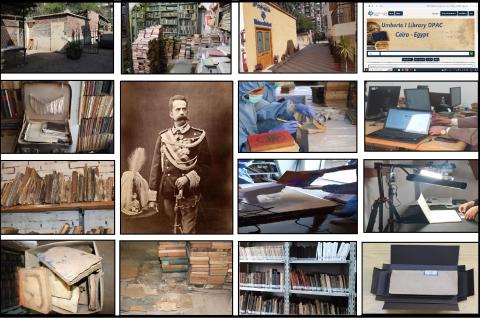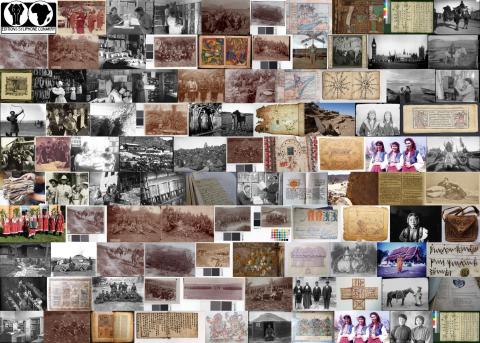
Aims and objectives
This project aims to collect and digitise the endangered archives of the Sudanese trade union movement, based on the survey carried out during the previous pilot project. A website will be devoted to the collected materials and a training course will be held, comprising of 10 weekly sessions of theoretical and practical aspects of archiving and digitisation.
This project will show the struggle to establish Sudanese trade unions by Sudanese workers themselves and will draw attention to the role played by trade unions in the period after the October 1964 revolution, when they dominated the government. In contrast it will also draw attention to other periods when unions were vigorous opponents of different governments and managed to survive the sustained oppression endured under three military regimes.
The archival materials are in very poor physical condition and on the verge of total disintegration. Many trade union leaders keep their documents hidden away, in unsuitable conditions. The materials are kept in houses without any access to modern technology or suitable conditions of storage. Most ex-leaders are aging and it is certain that their families will not take care of their papers. Any delay in undertaking this project means these archival materials will be lost forever. The unstable political situation in Sudan adds to the urgency of the project.
The Sudanese trade union movement played a radical role in the modern history of Sudan. It was a leading force in fighting the colonial state and in achieving Sudanese Independence. Also it offered the people of Sudan a new type of organisation that was not based on tribalism or religious affiliation. Moreover, it was the leading force that masterminded and led the overthrow of two military dictatorships, in 1964 and 1985. All these facts led the movement to be oppressed by three military regimes. It was banned and refused legal existence [in 1958, 1971 and 1989] and its collections have been confiscated by the State Security Services from unions' offices or leaders' homes.
During the pilot survey, there were no trade union archives or archival materials to be found in the National Records Office, universities or private institutions. Even in the national centre of trade unions there is no official archive and they have a collection for the post 2002 period only. The reasons for this were:
- The Sudan State Security Services, having confiscated the entire document collections of the unions three times, never returned a single document to its owner. Whenever they arrested any trade union leader or activist they confiscated their documents without returning them.
- Some trade union leaders were not aware of the importance of keeping their documents for the future and they kept their documents in the offices of their unions, usually at the back store. This placed the documents under the mercy of weather, pests and theft. Some union leaders, for political reasons, even decided to burn collections under their control. Two of the major known damages were done in 1979 and 1993. In 1979 all documents kept in the office of Sudan Railway Workers' Trade Union were burned by one of their leaders, claiming that it was 'waste' from the Communist era. In 1993 a group, appointed by the Military Government to run Sudan Teachers' Union, decided to burn all the documents they found.
- The government office of the 'Trade Unions' Register', which has legal powers to monitor, regulate and even dissolve trade union does not have any archive documents.
An Advisory Committee will help in advising and observing the project. The proposed Advisory Committee consists of: representatives of different trade unions, the National Records Office, veteran leaders of the movement, families of ex-leaders, journalists, academics, solicitors, main political parties, our volunteers and the director of our local partner. The Minster of Labour has agreed to sponsor the project and chair the Advisory Committee.
The main outcomes of the projects will be:
- A digital copy of the documents that will be collected.
- The original documents and a master digital copy will be kept at Abdel Kaream Murghani Cultural Centre in Sudan.
- A digital copy will be donated to the Sudanese National Records Office.
- A digital copy of the collection will be submitted to the British Library.
- A website will be created that is devoted to the preserved collection with free access to all.
- A training course on finding, archiving and preserving the history of the Sudanese labour movement will be held for trade unionists.
- The project will raise awareness among trade unionists and other civil society organisations about the importance of their documents and the necessity to archive them.
Outcomes
The project succeeded in locating, collecting and digitising the largest collection of Sudanese trade unions documents to be found inside or outside Sudan. Approximately 10,000 digital images have been taken and saved in three different formats: jpg, raw and tiff.
The project also organised a successful training course for trade unionists about different aspects of digitisation. Most of the course was practical, where trainees practised with a digital camera and produced their own images and saved them to a computer. Some of the trainees assisted in copying some of the collection, which was a great hands-on experience for them.
The project created awareness among trade unionists and activists about the importance of preserving archival materials for future generation. Some civil society organisations approached the team about their archival materials that were neglected for so long.
The original copies of the endangered archival materials have been housed in Abdelkareem Murghani Cultural Centre (Omdurman – Sudan) in a specially designed cupboard.
Digital copies have been deposited with the following institutions: Sudan National Archives, Khartoum; Khartoum University, Sudan Library, Khartoum; Sudan Workers Trade Unions Federation; Sudan Studies Centre, Khartoum; TUC Library, London; Sudan Collection, Durham University, UK; and the British Library.





